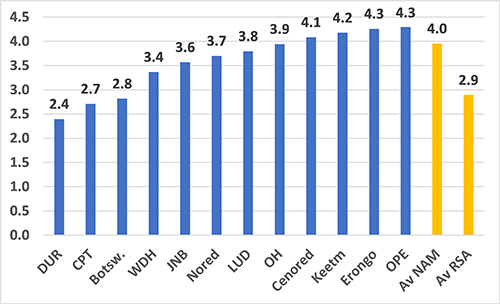Finance minister Iipumbu Shiimi said government has embarked on a study to fully comprehend the overall impact of elevated energy prices on food prices and supplies. The study aims to mitigate the impact of increasing energy prices and aims to determine any additional measures government has to take to reduce the burden on businesses and consumers.
Shiimi made these remarks on Monday at the press briefing where government officials provided feedback on the just ended World Economic Forum in Davos, Switzerland.
Consumers have been struggling with massive increases in food prices and more expensive bank loans, factors forcing them to tighten their belts even more. On top of this, the country has experienced massive fuel price increases.
For June 2022, petrol prices have increased by N$2.50 per litre, while diesel increased by N$1.50 per litre. This brought Walvis Bay prices to their highest levels ever of N$20.40 per litre for petrol and diesel to N$21.43 per litre.
In order to mitigate the local impact of rising international oil prices, the mines and energy ministry temporarily reduced fuel levies by 50%. In April 2022, Cabinet approved the ministry’s recommendation to temporarily reduce these levies from May to July 2022. Fuel levies and taxes make up 34% to 45% of the cost of Namibian fuel per litre.
Specific levies imposed on Namibian petrol and diesel prices include a customs and excise duty for the SACU Revenue Pool; National Energy Fund Fuel Levy (comprised of the fuel equalisation levy, Namcor levy and National Oil Storage Facility levy); road user charges, which go to Road Fund Administration (RFA) for road maintenance; fuel tax, which is collected by the Ministry of Finance for the State Revenue Fund, and the Motor Vehicle Accident (MVA) Fund levy, which is used to finance the activities of the MVA, such as providing financial assistance to road accident victims. Levies that were reduced include the road user charges (from 148 to 74 cents per litre), the fuel levy (from 90 to 45 cents per litre), the Namcor levy (from 7.6 to 3.8 cents per litre) and the MVA levy by 25% (from 50.3 to 37.725 cents per litre).
Shiimi said: “The most relief the nation can get is to grow the economy so that people can get employment and earn a livelihood. The work we are doing in speeding up the economy is going to help the nation.”
According to the Namibia Statistics Agency consumer price index bulletin for April 2022, the annual inflation rate increased by 5.6% compared to 3.9% recorded in April 2021. This was the highest annual percentage change above 5% recorded since December 2018.
On a monthly basis, the inflation rate increased by 1.4% compared to 0.5% recorded a month earlier. Transport and food and non-alcoholic beverages continued to be the main drivers of the annual inflation rate contributing 2.7 percentage points and 1.1 percentage points, respectively for the month under review. –mndjavera@nepc.com.na



